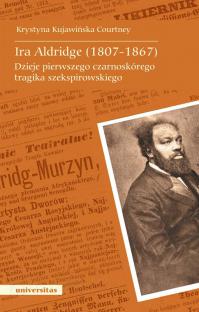Past events
Ira Aldridge, the first African American Shakespeare tragedian was born in New York (1807), and died in Lodz, Poland (1867).
Thursday, August 15, 2013, at 7:00pm
Krystyna Kujawinska Courtney is an Associate Professor at the University of Lodz, Poland, where she chairs the British and Commonwealth Studies Department and serves as vice-dean at the Faculty of International and Politological Studies. Her research interests focus mainly, but not exclusively, on literary theory, especially gender and New Historicist studies. Her scholarly work has been appreciated by prestigious foundations: she has been the recipient of fellowships from the Fulbright Commission, the Kosciuszko Foundation, the British Council, the Stefan Batory Foundation and the Folger Shakespeare Library.
Professor Kujawinska has also published, internationally (e.g, USA, Germany, Spain, Japan, Canada, Rumania, Great Britain) and locally in Poland, numerous articles and essays on the long-term global cultural authority of Shakespeare's plays and on his dramatic works in relation to theatre and early modern and modern culture. She is a member of the World Shakespeare Bibliography, and a co-editor of Multicultural Shakespeare: Translation, Appropriation, Performance. Her latest monographs are devoted to Ira Aldridge (2009), published in Poland, and to European culture in diversity (2011), published in Great Britain. In 2003 the President of the Polish Republic awarded her with the Gold Cross of Merit in recognition for her academic and educational achievements.
The Presentation:
Ira Aldridge, the first African American Shakespeare tragedian, who achieved international recognition and fame for his professional achievements, was born in New York (1807), and died in Lodz, Poland (1867). This lecture will present the most significant aspects of his life entangled with various aspects of slavery, the abolitionist and emancipation movements in the USA and Great Britain as well as deal with the questions of the colonies and the emergence of Africa as a "newly-discovered continent" in the minds of the Europeans.
On the Old Continent Aldridge played, among others, in Russia, France, Belgium, Sweden, Turkey, the Czech Republic. He visited Poland a remarkable seven times while on tour. Though frequently the color of his skin constituted the initial incentive for an audience, his professionalism turned him into an international star lionized by emperors, royalty, and common theatre goers. His conquest of racial and ethnic prejudices may serve as an example for those who struggle against various kinds of cultural, social and political exclusions: demonstrating that hard work, talent and vocational enthusiasm help us to fulfill our life dreams despite impossible odds.

